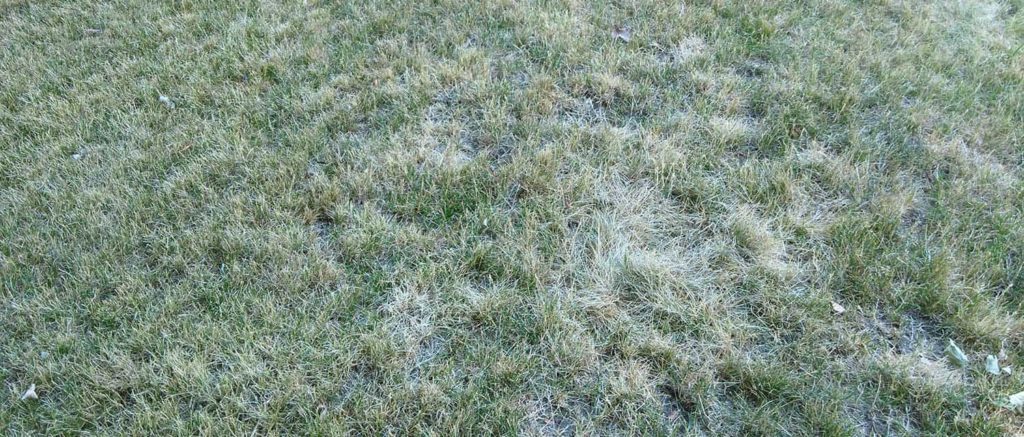From dog marks to grubs to fertilizer burns, it’s easy to repair a damaged lawn…
Like with most things, the best defense against a damaged lawn is prevention, but when it comes to lawn care, even the most diligent green thumb can end up with a burnt out, unattractive lawn.
These are the top 5 issues we see with damaged lawns on a regular basis:
- Over-fertilization, resulting in burnt or bare patches
- Urine damage from pets, also resulting in yellow, bare patches
- Insect and critter damage
- Weeds, including dandelions and crabgrass
- Lack of moisture
Over-fertilization And Pet Urine Damage
This kind of damage causes patches of burnt out lawn, where the grass has died and thinned out, or bare patches where there is basically no lawn left. There are two ways to tackle the problem in the specific patches: seeding or sod.
For seeding, you need high quality topsoil and grass seed, and you need to know the kind of soil you’re working with.
Step 1: Mow the whole lawn, paying particular attention to the areas you plan to re-seed
Step 2: Rake the soil areas that you want to re-seed
Step 3: Spread the grass seed according to the package instructions and roll the area to ensure that the seeds have good contact with the soil
Step 4: Add a layer of topsoil to the areas. This will help protect the seeds from blowing away or being picked up by birds and insects, while they germinate. It also helps to retain moisture, which the seeds will also need to effectively take hold.
For sod, preparation is key.
First off, plant your sod right away.
Step 1: Rake and prepare the damaged areas, lowering them to about 10-15 cm, below your lawn grade so your new sod will be level with the rest of the lawn.
Step 2: Remove weeds and clumps of clay.
Step 3: Till and level your topsoil (your finished topsoil should be an inch below the sidewalk curb.
Step 4: Install the sod in a staggered brick pattern if covering a large area, or in patches for spot repairs. Make sure edges are snug but do not overlap.
The sod needs to be watered frequently throughout the first season, and it will take a few weeks for the roots to truly take; Be patient!
Insect damage
Damage from insects occurs in two ways: from the insects themselves and from the birds and small animals that prey on the insects. Very often, lawn damage that is due to insects isn’t immediately visible, such as when the lawn is growing in the summer, but come the following spring, the damage may be very easy to spot.
Watch out for evidence of small animals, like raccoon droppings or a proliferation of skunks or birds congregating in one area of your lawn: these are signs that you’ve got grubs or other insects infesting your lawn. If your infestation is heavy, It will be hard to miss the quantify of torn grass resulting from these critters’ nightly grub hunts. They do provide a form of free pest control, but it’s at the cost of your lawn!
Pesticide bans in Ontario have made it difficult to deal with this type of infestation so your best bet is a thick healthy lawn and the easiest way to achieve that, again, is to re-seed or sod the affected areas, as described above.
It’s important to really work the ground, removing all the old sod, and keep an eye on re-seeded areas to make sure that weeds don’t take root.
TIP! A well-watered, appropriately fertilized and overseeded lawn is less likely to have issues with grubs and insects (and weeds, for that matter) simply because they’re more robust and can withstand the insects better, from the root upwards.
Weeds be gone
Issues with weeds like dandelions and crabgrass are similar to those of insects: they’re more likely to invade less healthy and bare areas of your lawn where competition for water and nutrients is less, and again, pesticide bans have made them more difficult to manage.
A healthy lawn will block out weeds before they can gain a foothold, so really the true solution to weed problems is prevention.
Unfortunately, once you have weeks, there’s no magic cure. You simply need to pull them by hand or by raking them from the root, then fix the lawn with seed or sod. After that, you can keep them at bay with a thick, healthy and well maintained lawn.
TIP! Don’t over-mow your lawn! A good lawn mower will have adjustable cutting heights so be sure to set it at the highest level: you want to be taking off no more than a third of the grass blade, each time you mow. Too short and the weeds will have an opportunity to invade!
Lack of moisture
The single biggest threat to a healthy lawn is lack of moisture. Without it, the grass roots will be shallow and easily disturbed, to say nothing of their inability to get the available nutrients in the soil.
How can you tell if your lawn needs moisture—before it turns brown, that is? Step on it. Does the grass retain your footprints or does it bounce back? If the former, you need to water. If the latter? Good job watering!
If you have any questions about seed, sod or anything else green thumb related, pop by the store or leave us a comment, below…


It’s actually a nice and useful piece of information. I am happy that you simply shared this helpful information with us.
Please stay us up to date like this. Thank you for sharing.